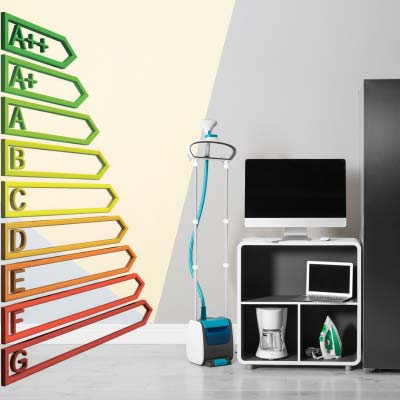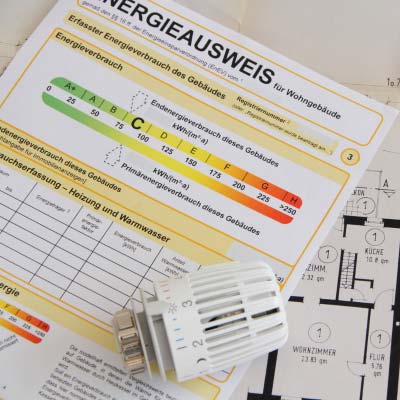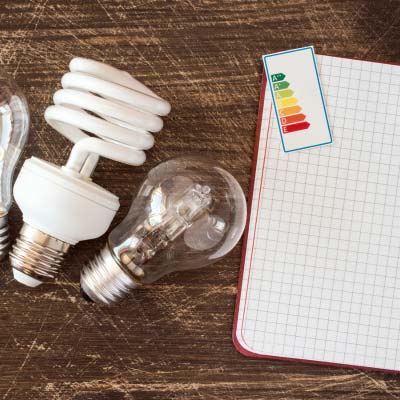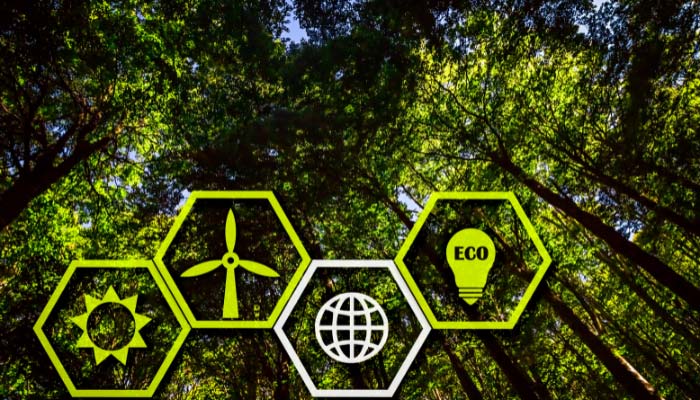Home / Services / Operations / Management Systems / Energy Labeling Certification: Driving Energy Efficiency and Sustainability
At IMPROV, we recognize the significant role energy efficiency plays in sustainable business practices. Energy Labelling Certification empowers businesses to showcase their commitment to reducing energy consumption, lowering operational costs, and contributing to a sustainable future. This certification not only aids companies in complying with regulatory requirements but also positions them as leaders in the green economy.
What is Energy Labelling Certification?
Energy labelling is a certification system that assesses and communicates the energy efficiency of products, ranging from household appliances to industrial machinery. The Energy Labelling Certification indicates a product's energy consumption and efficiency, providing consumers and businesses with transparent, reliable information to make informed purchasing decisions. The label typically categorizes products based on their energy performance, ranging from highly efficient (often marked as A or A+) to less efficient models (often marked as D, E, or F).
This certification is mandated in several regions, particularly within the European Union, and supports international efforts to reduce energy consumption and carbon emissions. The aim is to motivate manufacturers to improve product efficiency and encourage consumers to select energy-saving options.
Why is Energy Labelling Certification Important?

- Consumer Awareness: With increasing concern about climate change, consumers are more informed about the environmental impact of their purchases. Energy labels empower them to choose energy-efficient products, directly influencing their buying decisions and promoting eco-friendly consumption.
- Regulatory Compliance: Energy labelling is often a legal requirement, especially for energy-consuming products in the European Union and other regions. By obtaining certification, businesses ensure compliance with these regulations, avoiding potential fines and penalties.
- Brand Reputation: Energy efficiency is increasingly becoming a key factor in brand loyalty. Companies that showcase their commitment to sustainability through energy labels enhance their reputation as responsible and forward-thinking organizations, gaining an edge in the competitive market.
- Cost Savings: Energy-efficient products typically consume less power, leading to lower energy costs over time. Businesses that implement energy-efficient solutions benefit from reduced operating expenses, enhancing their bottom line.
- Sustainability Leadership: By adopting energy-efficient technologies and securing Energy Labelling Certification, companies take a leadership role in promoting sustainability. This commitment aligns with global initiatives to combat climate change and drive responsible consumption.
Energy Labelling Certification Process:

Initial Assessment
The first step involves evaluating your product’s energy consumption against established standards. This process can involve detailed technical assessments of the product’s energy usage and performance under specific conditions.
Documentation and Testing
Businesses must gather all necessary documentation to prove compliance, including technical specifications, performance data, and test results. Products may need to undergo energy testing by accredited laboratories to validate their performance.
Application and Evaluation
Once the product meets the energy efficiency requirements, businesses submit an application to the relevant certification body. An evaluation is conducted to confirm that the product adheres to the necessary standards and regulations.
Awarding of Energy Label
After successful evaluation, the product is awarded an Energy Label. This label is typically displayed on the product packaging, online listings, or at the point of sale, providing customers with easy access to energy performance information.
Ongoing Monitoring
In some cases, businesses are required to undergo periodic audits to maintain their certification. This ensures that products continue to meet energy efficiency standards and remain competitive in the market.
Challenges of Energy Labelling Certification

Complexity of Standards
The requirements for Energy Labelling can be complex, especially when different regions or markets have varying criteria. Ensuring that products meet all regulatory standards across multiple jurisdictions can be challenging.
Upfront Costs
While the long-term savings from energy-efficient products are significant, the upfront cost of achieving certification, including testing and compliance procedures, may be high for some businesses.
Technical Expertise
Gaining certification requires businesses to have technical expertise in energy efficiency. This may involve investing in product development, testing, and possibly redesigning products to meet required standards.
Ongoing Compliance
Maintaining Energy Labelling Certification requires continuous monitoring and updates. As energy efficiency standards evolve, companies must stay abreast of changes to ensure ongoing compliance.
Key Benefits of Energy Labelling Certification
Enhanced Marketability
An Energy Label provides instant recognition to consumers about a product’s energy efficiency. This helps companies attract eco-conscious consumers who prioritize sustainability, improving market visibility and driving sales.
Operational Efficiency
The process of achieving Energy Labelling Certification often highlights areas where energy consumption can be reduced. For businesses, this leads to increased efficiency in energy use, reducing overhead costs and environmental impact.
Global Recognition
Energy Labelling Certification is widely recognized, particularly in markets like the European Union, North America, and Asia. Being certified allows businesses to access international markets, where environmental credentials are increasingly important.
Competitive Advantage
Certification signals to customers that a business prioritizes sustainability, setting it apart from competitors. As energy efficiency becomes a key selling point, Energy Labelling can offer a competitive advantage.
Regulatory Alignment
The certification helps businesses align with mandatory regulations and industry standards, ensuring compliance with laws concerning energy efficiency and emissions reduction.
How We Help
At IMPROV, we provide expert guidance to help businesses navigate the Energy Labelling Certification process. Our comprehensive services include:

Regulatory Guidance
We help businesses understand energy labelling standards and identify the certification that aligns with their products and markets. Our consultants provide tailored advice on meeting the necessary energy efficiency criteria.

Energy Audits
We conduct in-depth energy audits to assess your products’ energy consumption and recommend improvements. Our team provides actionable insights to help you achieve certification and optimize energy use.

Documentation Support
We assist in preparing and compiling the necessary documentation, including test results, technical specifications, and performance data, to demonstrate compliance with energy labelling requirements.

Certification Application Assistance
We guide businesses through the entire certification process, ensuring that all necessary steps are completed efficiently and accurately. We also handle interactions with certification bodies on your behalf.

Training Programs
Our training programs ensure that your team understands the technical, regulatory, and operational aspects of energy efficiency. We equip your staff with the knowledge needed to maintain energy labelling compliance and integrate sustainability into your core business practices.
Our Expertise
At IMPROV, we bring a blend of industry expertise and technical proficiency to deliver tailored ISO 29001 solutions.
- Expertise: With years of experience in energy efficiency and sustainability certifications, we bring a deep understanding of Energy Labelling standards and can guide you through the certification process.
- Tailored Solutions: We provide customized support, designed to meet your specific needs and goals. Whether you are just starting the certification journey or need help maintaining compliance, we are here to help.
- Global Reach: Our consultants are familiar with international energy labelling standards, ensuring that your products are compliant with regulations in key markets around the world.
- Sustainability Focus: We are committed to helping businesses reduce their environmental footprint, improve energy efficiency, and enhance their reputation as sustainability leaders.
Energy Labelling Certification is more than just a regulatory requirement; it is an essential tool for businesses looking to reduce energy consumption, lower costs, and build a sustainable future. By partnering with IMPROV, you can navigate the complexities of the certification process, ensure compliance with energy efficiency standards, and achieve long-term environmental and financial benefits.
